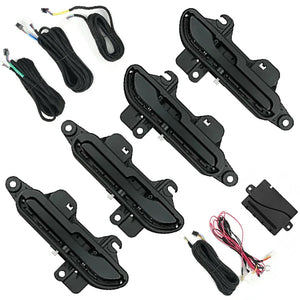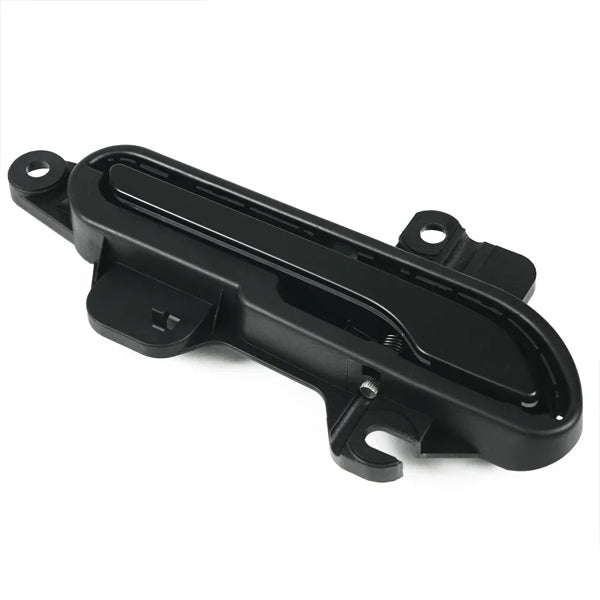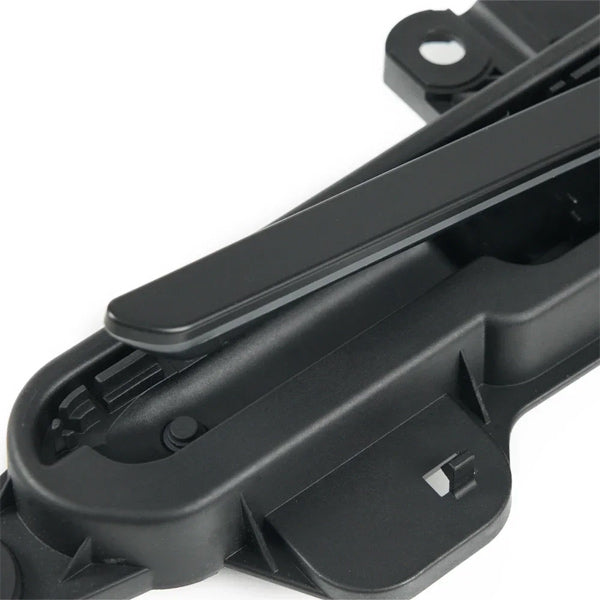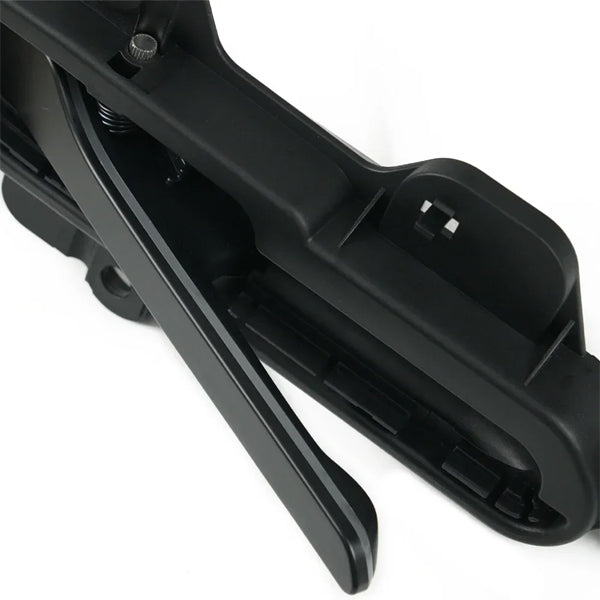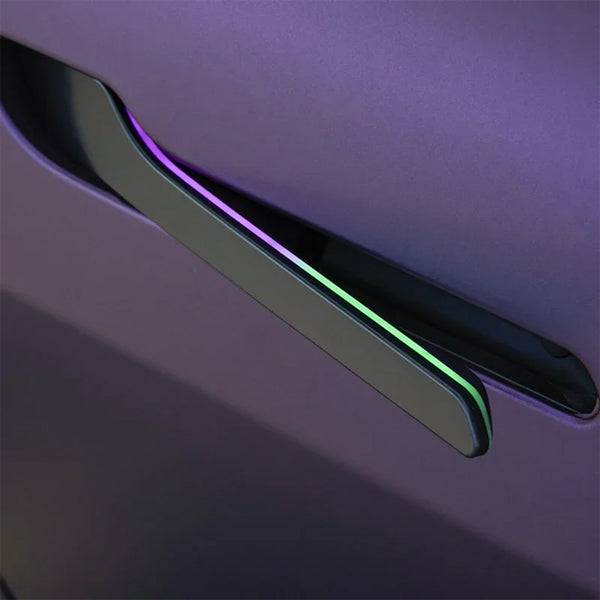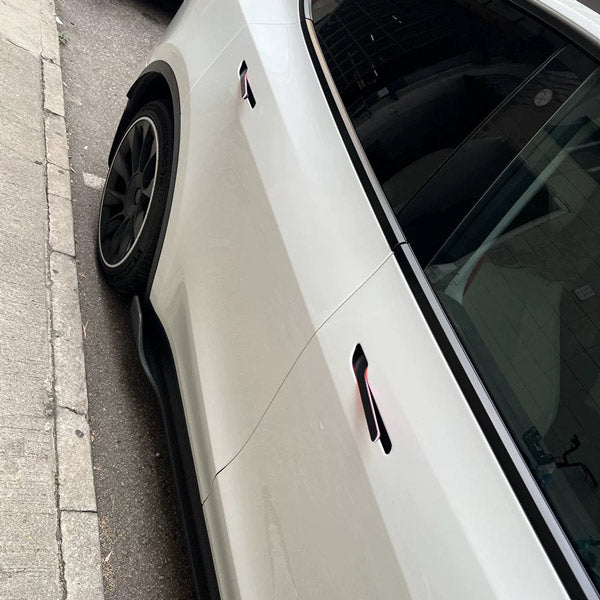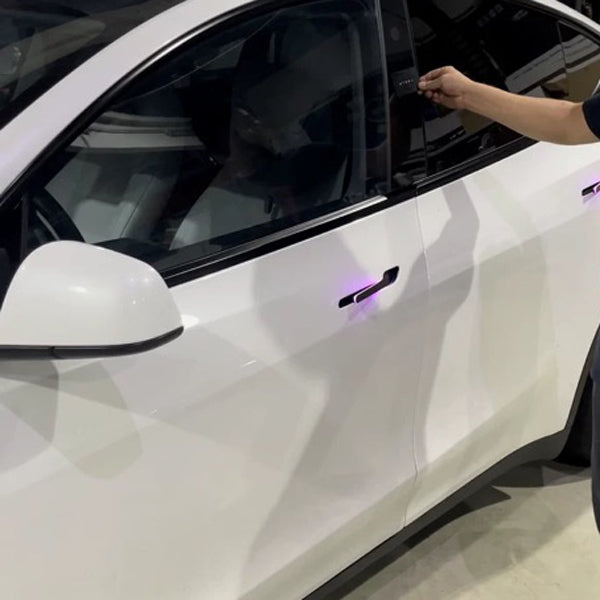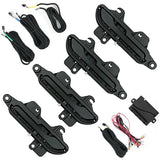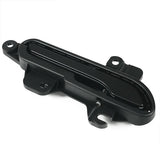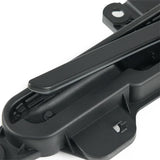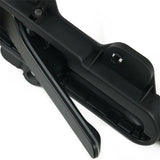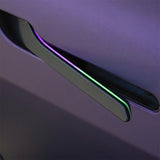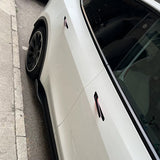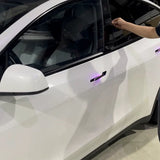Carbon door handle
Tesla Model 3 - Y
A simple and effective way to blend the door handles of your Model 3 or Y with the sportiness it deserves.
A sustainable composition
The carbon will wrap around the handles so that no part of the original chrome stands out, for a perfect finish.
The composition of the composite material incorporates an anti-UV resin to guarantee long-lasting durability without suffering the effects of UV rays.
Features of door handles for Tesla Model 3 and Y
- Original design: changes the look of your Tesla
- Perfect finish: in real carbon
- Fits perfectly: encompasses handle
- Applies easily: durable 3M double-sided
- Does not leave glue residue after uninstallation
- Year of correspondence: Model 3 and Y version 2017-2020 and 2021-2023
-
2 year warranty
_________
Model Sport's outstanding benefit in achieving carbon? Composite material: its characterization? Really, what is a carbon part?
Let's develop these ideas around three main axes:
• Return to the beginnings of the creation of carbon
• Model Sport, the brand with an unusual sense of detail
• The panoply of tuning components carbon for your Tesla
You will be able to provide yourself with a carbon element with confidence.
Determination of a composite material:
By definition, what is called composite material is the assembly of two elements together, which do not mix, but which produce an object more resistant to shocks/impacts/torsions/flexions than if they are used independently l each other. Typically you can use reinforced concrete as an example.
Carbon or Texalium, what can you find for your electric?
In fact, there are many kinds of carbon and many ways to work with it.
A distinction must be made which will be important for purists: what is commercially nicknamed "carbon" actually has the name "carbon fiber composite", this name is much more correct in the world of stratification.
3K twill carbon fabric in 200gr:3K carbon in twill weave is undoubtedly the most common in its category, let's start with this one. Twill is a name that determines the internal structure of the intermesh of the carbon wefts. Observe what the twill weave is in the image just above.
Twill is the most widely used braiding and for good reason, one of them is its maneuverability allowing appreciable adaptation in a mold with accentuated shapes and curvatures. That said, we will not detail the type of interlacing in 3/1, 2/2 and 4/4. The sign annotated “3K” designates the total number of strands which produce a single carbon frame, in total unit: 3000 strands.
To give you an order of magnitude, the thickness of a carbon filament is 1/20 of that of a human hair. To designate and name the most common types of carbon used in the different fields of industry, we must mention 1K, 3K, 6K and 12K.
For Tesla vehicles, we particularly appreciate 3K. 200gr/m² evokes that the carbon fabric, before its association with the resin, weighs 200 grams for a tablecloth of 1 meter x 1 meter. The combination of carbon characteristics that you come across the most is the twill weave in 3K and 200 gr/m², not for its mechanical provisions, but more for its aesthetics and its widespread use in many industries, which makes it good market.
Forged carbon:
A surname that may seem abusive for a very divergent appearance from the standards, however, this molding technique is nothing new. To manufacture it, you must first cut the carbon into small strips and spread it more or less evenly in the mould.
Now you have to put the resin and tighten the positive and negative master of the mold until you put them under pressure. The temperature of the mold is also increased during this phase.
This production process makes it possible to intensify the density of carbon fiber per square centimeter compared to the resin and thus gives a stiffer and lighter part.
Lamborghini is the pioneer in the use of forged carbon in the automotive field. However, it should be noted that forged carbon has been used in the development of warhead heads since the 1980s.
Texalium, the unusual:
Very often it is likened to carbon, but that has nothing to do with it. The Texalium is totally different in substance and form. It is actually a glass fabric loaded with aluminum and then tinted to the desired color to give it a different appearance.
Its mechanical properties are below the usual glass fabric (itself below the carbon fabric) and its use is purely for aesthetics.
We don't have to wait for other countries to see an innovation arrive here, Texalium is no exception to the rule, because it has been widespread in the United States for a few years, when it is only just becoming known In France.
Learn to distinguish real carbon
We are going to provide you with some examples of the use of carbon fiber.
We prepare quotes on request if you ever have a specific project in mind.
What mechanical force can be exerted on carbon?
Frequently asked, this is a request that deserves a little more in-depth development.
The real question will be whether carbon is stronger than another material. To give you an idea: an aluminum alloy that has a physical volume equal to a carbon part will be less resistant than the latter, all constraints combined.
"Resistant" is a term that means everything and nothing, because an aluminum part will perhaps behave better during impact, which will depend on the weave used for the carbon in comparison. This is one of the aspects of carbon that allows us to produce components as thin as inserts.
The dashboard insert for the Y or 3 models is worth mentioning: this element is only useful for its aesthetics (as with the majority of carbon elements for Tesla).
However, it should be noted that this element of more than 1.40 m can be produced using only 2 layers of carbon. It can then be transported throughout the French country or other neighboring countries.
Why is carbon fiber so expensive?
One of the key parameters to explain the price of carbon fabric is to look at its production.
A single carbon fiber already requires quite a remarkable amount of technique. It takes a very heavy production operation in terms of energy consumption to make the carbon fiber: we start from a particular synthetic fiber, called polyacrylonitrile, which will have to be put under oxidation and then carbonized in a specific way to get the carbon fiber.
The awareness of more and more industries of carbon fiber elaboration gives rise to certain projects, entirely directed with the aim of developing it using the least possible chemical products.
There is an exponential growth in demand for the application of bio-based materials to remove the vast majority of chemicals and also cut the price in half. The tools necessary for the production of the raw material of carbon are substantial, as are for its weaving.
Keep in mind that compared to a human hair, carbon fiber is 20 times thinner. For information, the square meter of carbon fabric is acquired at the price of 30 euros. This applies in particular to the 200 g/m² twill 3K carbon.
The number of layers as well as the cost of the resin to be used are also elements to take into account. Then, the expertise of a laminator who knows how to install and put the materials in question in the right conditions.
What distinguishes Carbon for Tesla from Model Sport
A part that we are lucky to master, because we scrupulously analyze all the manufacturing steps. One of the foundations that will assure you of successful results in any area is “who are you listening to?” Listen only to people who have the results you want to have”.
You must therefore turn to the creator of the company Model Sport, designer and body builder, to find the know-how necessary for the development of carbon components for your Tesla.
A carbon cloth or a slatted version?
It is an indisputable fact, in the 21st century carbon is mainly used for its finish, more than for its primary application: its mechanical capacities and its lightness. In the Tesla realm, most carbon parts will not be subjected to any torsion or bending stress.
These are elements intended to reflect the sportiness of the American brand. Any type of carbon, even one that will be categorized as low-end, will be able to withstand the constraints imposed on it.
To date, there are several categorizations of carbon stiffness. But the most used being the "HR" or High Resistance for flexibility and versatility. For all the carbon parts of your Tesla, Model Sport is also based on this type of carbon which is very widespread and so practical on a multitude of points. There is also HM carbon, which is literally referred to as “High Modulus”.
It is intended for productions that require extreme lightness, without any force being involved. And if a constraint must be affixed to it, it will be systematically combined with the HR. The reference we can provide concerns forged carbon: it is generally used for its configuration, however its primary purpose is unconventional resistance.
What is the best resin to use?
Now let's talk about the key element of carbon parts: the resin. The polyester type resin is usually used for mass lamination on fiberglass parts.
This is also prioritized on carbon parts which require high endurance to heat. To give you an image, polyester is used for the production of motorcycle carbon cartridges.
Epoxy resin will greatly increase the endurance of parts subjected to residual loads. Various tests have shown that one resin stands out among many others: anti-UV epoxy resin.
It does not tarnish over time and preserves the true look of carbon. The aggressions of UV rays emitted by the sun will thus have no effect on your carbon parts, what is more, the appearance is more transparent. This is the strongest point of this type of resin: the parts will not yellow in a few years.
Not mentioning this point is a lack of knowledge: if the treatment is not present, beware of too hot summers which will give the carbon parts a duller appearance. Several parameters are taken into account when buying a resin, this is what will partly determine its initial price: its ease of application, its long-term hold and its quality of production.
Although the price may vary depending on the manufacturers and retailers, it is interesting to make a comparison on French territory between these different resins:
• 1kg of Polyester resin = 8 to 10€
• 1kg of Epoxy resin = €50 to €60
• €55 to €65 for the kilogram of anti-UV Epoxy resin
The final varnish administered for the carbon parts
The finishing varnish is the last touch necessary for the production of carbon parts. In the past, no paint was applied to the carbon parts at all. The reason is that this ensured the longevity of the components. On the other hand, it was necessary to succeed in the making from the first try.
Which induces a very high and counterproductive scrap rate taking into account that the spirit of the Tesla brand is to reduce pollution, so this waste was nonsense. The use of a top quality topcoat seemed obvious.
It is for this argument that high quality varnish has imposed itself in our production process to "standardize" the process. The matte varnish gives a more luxurious finish, however, it needs extreme delicacy for its application in order to acquire the desired result. Will the shiny finish be polished with a polisher to guarantee a mirror effect of the surface of the parts.
What kind of carbon fabric do we find on the Tesla Model S and X
At first glance, the two vehicles all have similar interior elements. However, a number of parts remain very different depending on the year of registration.
It is with this in mind that it is mandatory for us to call you, after ordering, to find out the year and month of manufacture of your vehicle.
Model S and X interior
The personalization of Tesla elements is much more popular on the Model 3, however your Model S and X can also receive interior upgrades. Inserts such as for the dashboard, the central console or the part of the cup holder.
One of the main elements of your Model S or X is undoubtedly the steering wheel. This can be personalized to infinity, in twill or forged carbon, glossy or matte and leather or Alcantara trim.
For the latter, we offer a very precise personalization service on demand which will give you total control when placing your order.
Model S and X exterior features
The performance spoiler for the Model S is the most sought after. In its matte version, you will have the same appearance as the one present on the Performance versions of the Model S, with the difference that the Model Sport has a different bonding surface and internal structure.
Once the spoiler is in place, no difference is visible. The Plaid version is also in development at the time of writing this paragraph. Smaller components such as the mirror caps or the grille can benefit from their full carbon finishes.
If you ever want a personalized creation based on Texalium or forged carbon, you can contact us by phone or email to find out more about your project on your Model S or X.
The Model 3 and Y: perfect bases for carbon projects
The most modified electric vehicle of all time is undoubtedly the Tesla Model 3, which receives an incredible number of carbon-based modifications.
Tesla's two best-selling nuclear cars share a lot of similarities.
The Model 3 and Y and their cabin upgrades
Carbon inserts are almost standard equipment for the Tesla community. Producing such a thin element in large quantities while maintaining a similar quality is a technological feat.
Each insert must be able to be applied without giving an "addition" effect. This is where the biggest challenge with inserts lies. It is for this reason that it took us numerous trials to finally succeed in manufacturing extremely fine inserts to cover a dashboard, a door trim, a central console or even an armrest while giving feels like part of the original finish.
What defines the precision of the insert lies in the meticulousness of its cutting, as well as in the overall shape taking into account an ultra-thin double-sided to fit as close as possible to the components.
For the most discerning owners, replacement carbon components also have a strong following among the Tesla community. For purists who love beautiful parts with meticulous manual work, the carbon dashboard and door trim will satisfy you.
The Model 3 and Y: exterior improvements
As with the interior, the exterior of the Model 3 and Y has a large number of possible modifications. You can totally makeover your Tesla using 3K twill or forged carbon.
It concerns matte or glossy finish. The Performance spoiler is a must in the series of carbon parts for Model 3. The same goes for the Model Y. To be fixed directly on the trunk (or trunk for the Model Y), it has become a standard for Tesla personalization.
You can also choose more daring upgrades like the real carbon front cover, an absolutely stunning piece that is sure to give you some weight loss, while keeping its application fully functional.
- 🇫🇷 Gestionnaire Français
- Commandez directement au Fabricant ou au Distributeur
- Payez que votre produit (pas de frais de stockage ni de taxe territoriale)
- Livraison dans toute l'Europe !
Vous remarquerez que le bouton au-dessus vous redirige vers un des distributeurs ou fabricants du produit.
La major partie des accessoires Tesla proviennent de Chine, commander via les plateformes Aliexpress, Alibaba, Amazon, Hansshow ou Jowua vous donnera la possibilité d'obtenir le produit sans intermédiaire.
Les produits vendus en France ou en Europe proviennent du même fabricant Chinois (ou autre), mais avec une marge supplémentaire servant à payer les frais de fonctionnement de la société.
Cependant, l'avantage de commander à proximité est d'obtenir un délai de livraison plus rapide (néanmoins nous proposons aussi des produits expédiés directement depuis des stock Français ou Européens)
Model Sport a initialement commencé en faisant du stock en France, nous connaissons donc quels sont les fabricants de confiance et leur méthode de travail. Si bien que nous les citons avec leurs accords : MAOFA, BFB carbon, Yute Technologie, DCR Tuning, LITA Accessories, Jogon, Ever carbon, Carbonss Tuning, Jowua.
Ces fabricants, parmi quelques autres, sont les plus actifs et sérieux dans leur qualité de fabrication. Nous vérifions que les produits proviennent systématiquement de notre liste de fabricant. Ainsi, que vous commandiez via un distributeur Aliexpress, Amazon ou autre, nous savons que le produit sera de bonne facture.
